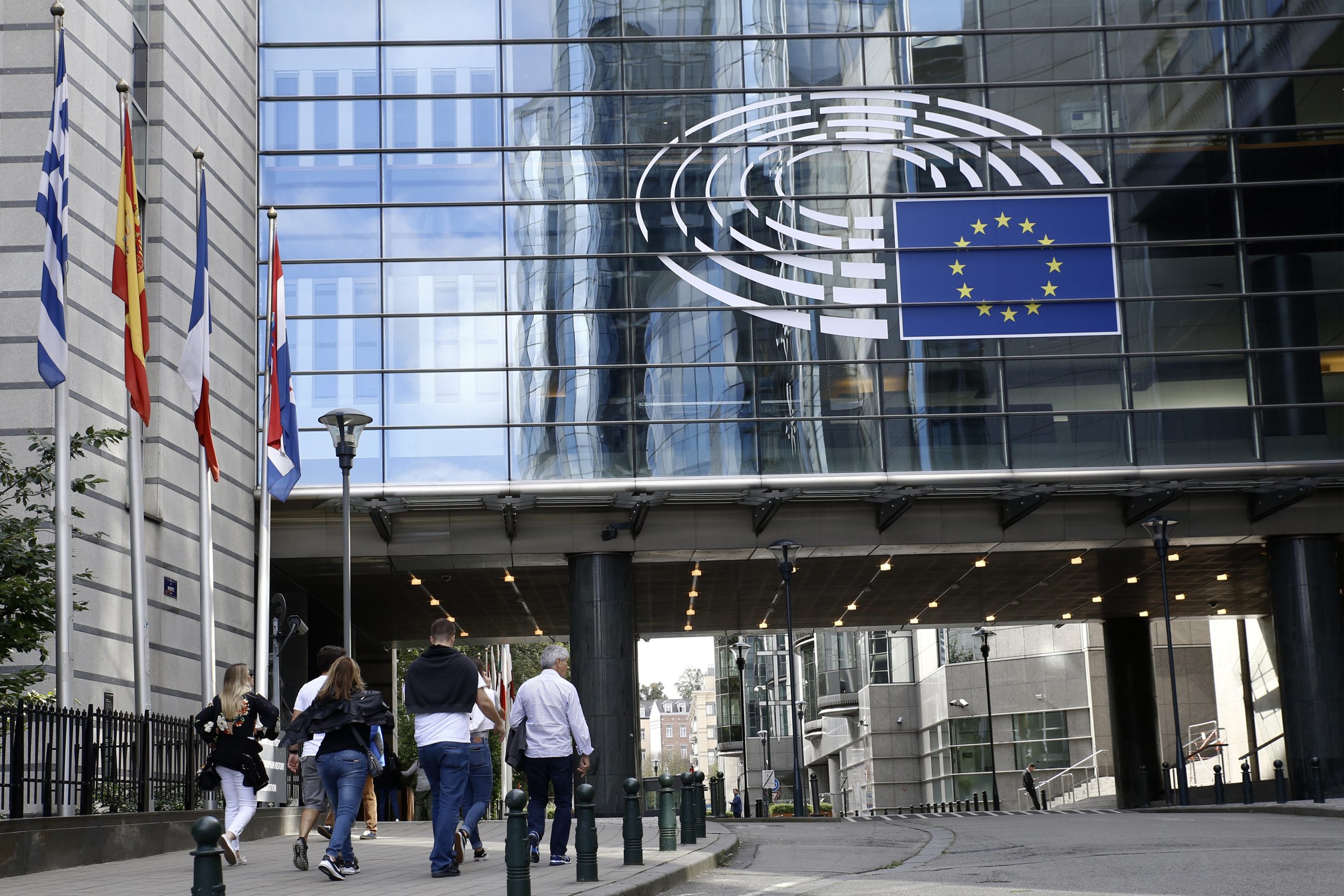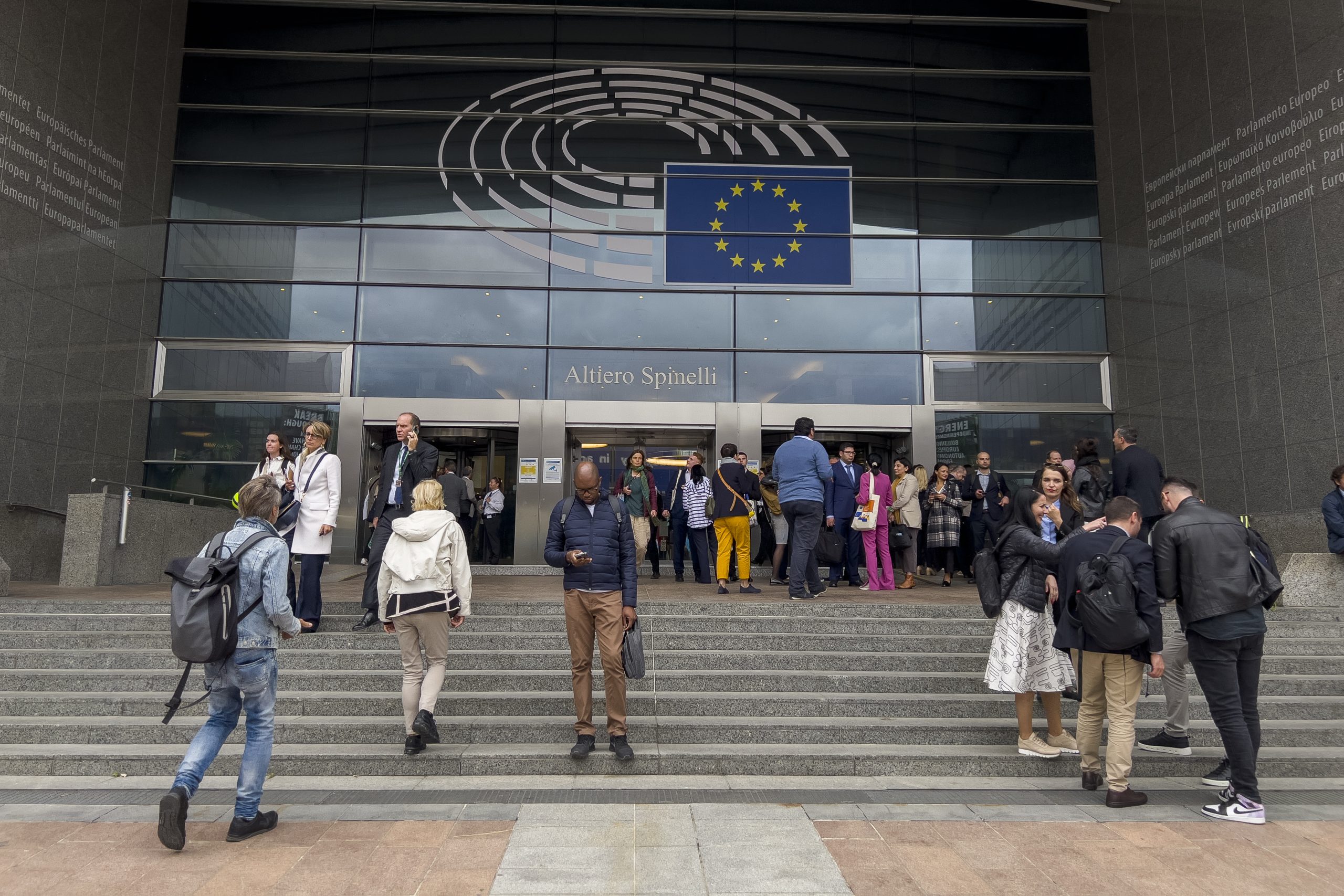The proposal of the European Parliament for the amendment of the Treaties: a slim majority for major institutional changes?
A previous writing on Constitutional Discourse has analyzed the proposal of the constitutional affairs committee of the European Parliament for initializing the ordinary revision procedure of Article 48 TEU for the amendment of the Treaties. Last week, the report has reached its final stage and has been adopted by a slim majority by the plenary of the European Parliament. Out of 609 MEPs voting, 291 member has voted for, 274 against the report, with 44 abstentions. According to its official website, the European Parliament (Parliament) had 702 members on the day of the vote took place.
This means that the Parliament has initiated the amendment of the Treaty on the European Union and the Treaty on the functioning of the European Union, which are the amended founding treaties of the EU laying down the foundation and the framework of the EU and its functioning and as well as to the Charter of Fundamental Rights of the European Union (Treaties). This includes its principles, organization, procedures, substantive law, and most importantly the competences and thus where the EU has a right to decide about certain issues.
The proposed amendments to the founding treaties affect the principle of institutional balance of the European Union as well, which does open up some questions in the field of institutional issues. The Parliament would gain significantly in case of the adoption of the procedure, while the prerogatives of the Council of the European Union (Council) and the European Council (EUCO) and thus the representation of the Member States in EU decision-making would be drastically reduced. This, however, would affect the chances of the proposals being reflected in a potential European convent as well.
After a short analysis of the proposal’s institutional aspects, a comparison will be made between the principle of institutional balance and the report and thus the potential success of the report in the Article 48 TEU procedure.
Institutional reforms proposed by the Parliament
The proposal of Parliament aims to abolish unanimity decision making horizontally, in all fields and would only apply qualified majority and “reinforced qualified majority” voting. It would abolish it in procedures related to rule of law, in the field of foreign and security policy and in all other fields as well.
The change of voting thresholds would affect one of the most sensitive procedures in the EU’s legal system. The Article 7 procedure (Article 7 TEU, amendment 10-12 of the proposal) would be modified so instead of a 4/5 majority of the Member States, only a qualified majority would be needed to establish that “there is a clear risk of a serious breach by a Member State of the values referred to in Article 2” (amendment 9-12). The European Council – instead of unanimity – would decide by a qualified majority and a deadline of six months has been added here as well, to submit the existence of a serious and persistent breach by a Member State of the values referred to in Article 2 to the European Court of Justice (ECJ). The ECJ could, as a sanction, impose a suspension of commitments and payments from the Union’s budget, suspend certain rights deriving from the Treaties (including voting rights of the government in question in the Council and EUCO).
This part is clearly not in the interest of the Member States, as it puts more pressure on them and there is no proposal in the text for the assessment of breaches of rule of law by EU institutions, for example by resolutions or reports of the European Parliament. (The debate regarding the conformity of the principle of rule of law with certain actions of the European Parliament comes up from time to time, for example, when the Parliament has decided to allow digital voting in its meetings retroactively in its Rules of Procedure, where only in person voting was legally possible).
Another question would be that it is clear from its nature that the Article 7 procedure was meant to be a political tool rather than a legal one. This can be read from Article 7 TEU itself as well (it gives an important role to the European Parliament, a body where elected representatives work in political Groups organized by common political affiliation) and from articles of experts from the academia as well. Would it be in line with the principle of rule of law to force the European Court of Justice to decide about issues related to party-political interests and the realm of politics in general?
The report suggests lowering the majority from unanimity to qualified majority in EUCO for establishing the number of mandates (composition, amendment 23) for each Member State in the European Parliament, on the proposal of the European Parliament. This would mean that a Member State could lose a significant number of mandates in the European Parliament, if a sufficient number of Member States would form an alliance of convenience on this issue, and others could gain significantly more as well. The protection of unanimity in this case would be lost, thus any Member State could lose a significant number of mandates if others agree – within the rather discretionary framework of the principle of degressive proportionality.
The report (which was drafted without consulting the Council) would abolish the current system of council formations within the Council. This reflects the idea of reforming the EU’s institutional structure to establish a bicameral legislative system, as such proposals were put forward in the European Parliament before in this context.
There are amendments that propose symbolic changes as well. The report wishes to create the “President of the European Union”, the “Secretary of Foreign Affairs and Security Policy”, all other commissioners would be renamed secretaries and the European Commission would become the “Executive”. Renaming the members and the institution of the European Commission with terms similar to the ones in certain countries’ governments would be a step towards leaving the principle of independence of the European Commission behind. The fact that the proposal did not recommend deleting the reference to the principle of independence of the European Commission in the Treaties, while suggesting involving the Commission more in every-day politics could be considered a codification error, a lack of consistency, controversy in the proposal. The report also proposes to fix the number of the members of the Executive (Commission) to 15 members.
The president of the EU would be elected through the – this time formally established – lead candidate system, meaning EUCO (and thus the Member States) would be deprived from the possibility of proposing the candidate for the presidency of the EU (currently for the European Commission). This is another right that Parliament would establish for itself on the detriment of the rights of the Member States, and quite a significant one as well. In a lot of cases, the proposed candidate has a good chance of becoming the next leader of the Commission, Parliament would have significantly more influence on the functioning of the European Commission. Even more so, if we consider that the proposal recommends to establish a motion for individual censure of a member of the Executive. This would erode the independence of the European Commission even further.
Regarding the entering into force of this Treaty modification, the proposal recommends that it shall enter into force “on the first day of the month following the deposit of the instrument of ratification by the governments of four-fifths of the Member States”. This idea similar to the entry into force clause of Article V. the Constitution of the United States regarding the entry into force of constitutional amendments, signaling a message that the EU would take a significant step towards becoming a federal state.
The EU would receive new competences in the fields of protection of human health, sexual and reproductive health and rights; cross-border infrastructure; external border policy; foreign affairs, external security and defense, civil protection, industry, education; gender equality. The European Parliament would gain the right to participate in adopting legal acts in the field of non-discrimination, the procedure would be changed from special legislative procedure (currently unanimity requirement in the Council) to ordinary legislative procedure (qualified majority voting required in the Council, with a significant role of the European Parliament during the procedure).
Furthermore, the European Parliament and the Council would have the right to adopt common provisions on preventing the sale of passport, other abuses regarding the acquisition and loss of citizenship of the Union by third country nationals, with approximating the conditions under which citizenship can be acquired. Considering that European citizenship is a purely derivative citizenship, meaning that it can only be acquired and lost through acquiring or losing the citizenship of a Member State, this is an attempt for the EU to receive a role in the regulation of citizenship of the Member States. Considering that citizenship is in fact the very relationship between a state and its citizens, it is a fundamental part of national sovereignty. It is clear that Member States would be hesitant to give up any competence in this field. The EU would also gain competence for laying down the “minimum conditions for entry, residence and minimum standards for the issue by Member States of long-term visas and residence permits”, according to amendment 102 in the proposal.
The European Parliament would gain a stronger role in adopting or modifying the electoral act regulating its own election. In the Treaties in force, Parliament has the right to initiate the modification of the electoral act, but the Council may modify it and decides unanimously. Amendment 187 would change this to a reinforced qualified majority.
Furthermore, the regulation regarding of the rights of citizens residing in another Member State to participate European or municipal elections would be decided in an ordinary legislative procedure instead of a special one. Measures concerning family law with cross-border implications would be adopted in ordinary legislative procedure, with an important role for the European Parliament (instead of the current special one, where the Council decides by unanimity on these issues, without the Parliament).
There are further proposals for amendments of the Treaties regarding the field of investments, budget, right of inquiry, auditing. Member States are obliged (amendment 121) to ensure that investments are made in order to achieve European economic, social, environmental and security objectives. A permanent mechanism to monitor and examine foreign direct investment in the Union would be established (amendment 177). Decisions regarding taxation would not require unanimity in the Council (amendment 188). The European Parliament and the Council would adopt the multiannual financial framework in ordinary legislative procedure according to amendment 228 (instead of a special one, with a requirement of unanimous decision in the Council). The European Parliament would be able “to summon any witness to participate in a hearing before it, if this is necessary in order for it to be able to fulfil its tasks” (amendment 190). The number of the members of the court of auditors would correspond to two-thirds of the number of Member States, instead of the current one member per member state provision (amendment 207).
The modifications requested by the European Parliament would clearly favor the Parliament itself and they are quite extensive. There has been no significant modification in favor of the Member States. The list of competences was not assessed and adjusted in this proposal, it has not considered the practical aspects and needs of the changes necessary to the list of competences. There might be some fields where more EU action is needed, but there might be others where the actions of Member States are necessary. The proposal, therefore, seems to be imbalanced in this respect.
A head on a hat – problems with the principle of institutional balance
The question arises, whether the proposal of the European Parliament infringes upon the principle of institutional balance. Arguably, this principle is either the manifestation of the separation of powers on EU level, or a supplementing principle to it, making it an elemental part of the principle of rule of law. The European Court has stated in Case 70/88, Parliament v. Council, “Observance of the institutional balance means that each of the institutions must exercise its powers with due regard for the powers of the other institutions”.
Parliament is requesting powers to have a significant influence on the person of “the president of the European Parliament”, to have more control over the European Commission, a stronger control over the Member States in rule of law issues, without a control over the actions of EU institutions. Lowering the majorities required to decide in the EU institutions would remove an obstacle for the European Parliament in front of many of its initiatives, (like the right of inquiry), but this would mean that the Member States would have to give up more of their powers and would have less chance to protect their interests in the Council. Meanwhile, Parliament would gain significant new competences in a one-sided manner, without any review of the current competences in favour for the European Parliament. It would have more powers regarding its own electoral legislation and composition, in institutional fields, in budgetary matters, in legislation, and generally more influence in every-day politics. There are no proposals, however, on solving the transparency-issues of the European Parliament, or on a mechanism ensuring the application of Article 2 TEU, especially the principle of rule of law by the Parliament. The European Commission would become a more political actor and the European Parliament would gain more powers, while the Member States would lose a lot of their own rights and guarantees.
According to its own position, the European Parliament has already proposed the amendment of the Treaties in its resolution in June 2022 to no success. The Member States in the Council did not forward the proposal to the European Council, which would decide about the necessity of a European convent. Would a proposal that strengthens the European Parliament in the institutional system have success this time?
Furthermore, the people of France and the people of the Netherlands had rejected the proposal of renaming the leading officials of the EU to official titles similar to the ones in certain countries. Would a new round of referenda lead to a different result two decades later? Would the Member States approve a proposal that requires them to give up more of their competences in favor of the EU institutions?
Árpád Lapu is a policy adviser on constitutional issues at the European Parliament since 2019 and a PhD student of the Károli Gáspár University of the Reformed Church in Hungary. Between 2017-2019, he worked as an adviser at the Cabinet of the Minister of Justice of Hungary, conducting comparative constitutional analyses. He has earned his JD at the Pázmány Péter Catholic University in Hungary, has a BA in international relations from the University of Szeged and an MA in European and international administration from Andrássy Gyula German Speaking University in Budapest. He has completed an Edx MicroMaster in cooperation with the Catholic University of Louvain (UCLouvain) in international law. His field of research is non-participation in armed conflicts in international law and constitutional norms regarding non-participation in armed conflicts. He has written publications regarding the future of the EU ETS system of the European Union, institutional reform proposals of the Union, and research in the field of social sciences.








